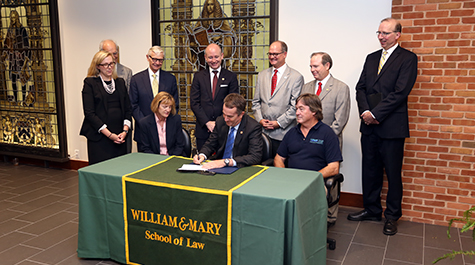Virginia Governor signs bill establishing new cabinet position to address coastal adaptation and flooding
Governor Ralph Northam visited William & Mary Law School on Friday, June 22 to sign two bills, House Bill 345 and Senate Bill 265, establishing a new cabinet position for Virginia: Special Assistant to the Governor for Coastal Adaptation and Protection.
Joining the Governor were public officials, including Del. Christopher Stolle (83rd District), who was the patron of HB 345, Sen. Monty Mason (1st District), Del. Mike Mullan (93rd District) and Williamsburg City Counselor Benny Zhang ’16, as well as President Taylor Reveley, William & Mary officials, and members of the Law School faculty, staff and students.
The new cabinet position will function as the lead in developing and providing direction and ensuring accountability for a statewide coastal flooding adaptation strategy.
“It’s our honor as a law school to host this signing ceremony for creating legislation establishing a new position,” said Davison M. Douglas, Dean of the Law School and Arthur B. Hanson Professor of Law. “Our law school, and our university, is intensely interested in issues of coastal protection and adaptation; this includes the work of our Virginia Coastal Policy Center, which has become a major center for addressing these issues, as well as William & Mary’s Virginia Institute of Marine Science.”
During his remarks, Governor Northam said that solving the problem of coastal flooding is one of the most important issues facing Virginia today.
“It’s important to folks that live on the water; it’s important to our economy; it’s important to our infrastructure and transportation; and it’s also important to our military,” Northam said.
Northam reminded attendees that the military and government contracting are a very important part of the Hampton Roads economy. Sea level rise, he noted, might threaten the Navy to move carrier units to other places in the country.
“If we embrace this as a challenge for coastal Virginia, we can actually do it in a way that can drive the economy and put people to work,” Northam said. “So it’s really a win-win that we’re able to stand here today and move forward with this piece of legislation.”
In brief remarks, Del. Christopher Stolle of Virginia Beach said that the Hampton Roads area has, until recently, looked at water as an asset.
“We now have started looking at water as a threat to our future and to our well-being,” Stolle said.
“This position is about looking at water again as an opportunity,” Stolle said. “I see this position as an economic development position. How do we get our economy to use what we have learned and turn and market that in other areas? And equally, and more important, how do we use that position to coordinate with the federal government to get their help with us on the path down the road?”
On hand to witness the signing was Elizabeth Andrews, Director of the Law School’s Virginia Coastal Policy Center. With the Center engaged in policy analysis to assist state agencies, localities and planning district commissions, Andrews is grateful for the increased focus on adaptation that the new position will provide, and the many people who made passage of the bill possible.
“This bill is important because it establishes a funneling point for economic development efforts, fundraising efforts, looking at different research efforts that try to deal with sea level rise and recurrent flooding in our coastal areas,” Andrews said. “It’s a very important bill for the Commonwealth and for Hampton Roads.”
About William & Mary Law School
Thomas Jefferson founded William & Mary Law School in 1779 to train leaders for the new nation. Now in its third century, America's oldest law school continues its historic mission of educating citizen lawyers who are prepared both to lead and to serve.
